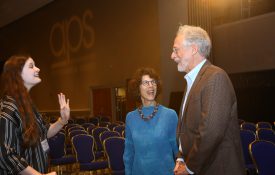-

Apply for NIH Training Institute for Dissemination and Implementation Research in Health
NIH is leading a Training Institute for Dissemination and Implementation Research in Health designed to educate scientists about conducting dissemination and implementation research.
-
How To See The Future (No Crystal Ball Needed)
After a disaster happens, we want to know, could something have been done to avoid it? Did anyone see this coming? Many times, the answer is yes. There was a person — or many people — who spotted a looming crisis and tried to warn those in power. So why didn't the warnings lead to action? This week on Hidden Brain, we look into the psychology of warnings. Plus, we'll learn why ordinary people can sometimes do a better job of predicting the future than the so-called experts. They're the subject of the book Superforecasting: The Art and Science of Prediction, co-authored by psychologist Phil Tetlock and journalist Dan Gardner.
-

A Monumental Gathering
Washington, DC was the locale for the 31st APS Annual Convention, where APS President Barbara Tversky (center) and APS Fellow Michael Tomasello (right) chatted with an attendee. See Tomasello’s Fred Kavli Keynote Address on the APS YouTube page.
-

New Research From Psychological Science
A sample of research exploring life satisfaction and well-being, how men’s facial hair influences anger displays, working memory capacity and mind wandering, and the temporal dynamics of perceiving weight.
-
How To Help A Kid Survive Early Puberty
From surging hormones and acne to body hair and body odor, puberty can be a rocky transition for any kid. But girls and boys who start physically developing sooner than their peers face particular social and emotional challenges, researchers find. "Puberty is a pivotal time in kids' lives, and early maturing boys and girls may be more likely to struggle psychologically," says Jane Mendle, a psychologist and associate professor at Cornell University. A 2018 study conducted by Mendle and her team found that girls who entered puberty significantly earlier than their peers were at higher risk for mental health concerns.
-
Primal Fear: Can Monkeys Help Unlock the Secrets of Trauma?
On Valentine’s Day, 2018, five months after Hurricane Maria made landfall, Daniel Phillips stood at the edge of a denuded forest on the eastern half of a 38-acre island known as Cayo Santiago, a clipboard in his hand, his eyes on the monkeys. The island sits about a half-mile off the southeast coast of Puerto Rico, near a village called Punta Santiago. Phillips and his co-workers left the mainland shortly after dawn, and the monkeys had already begun to gather by the time they arrived, their screams and oddly birdlike chirps louder than the low rumble of the motorboat that ferried the humans. The monkeys were everywhere.

